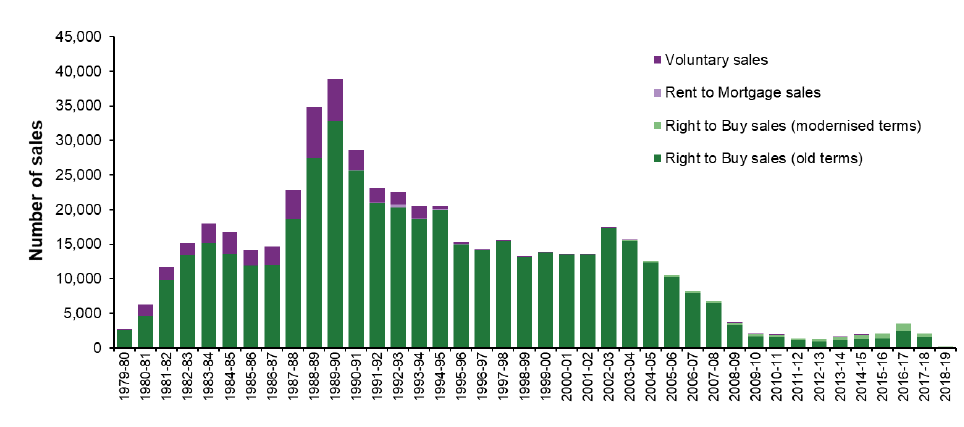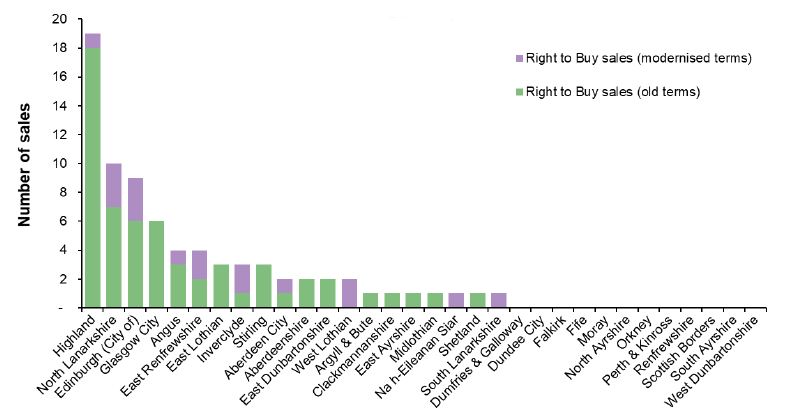Housing statistics 2019: key trends summary
Annual statistics up to 31 March 2018 on total new housing supply in Scotland across all sectors, along with information on various elements of local authority housing such as stock, lettings, house sales, evictions, housing lists, and housing for older people and people with disabilities.
Sales of Local Authority Housing to Sitting Tenants (Right to Buy)
After a small upturn in 2002-03, public authority Right to Buy sales (including local authorities with total stock transfers) declined consistently to a level of 1,209 in 2012-13. Sales increased each year since then, up to 2016-17, though have decreased in the last two years following the scheme closing to applicants in July 2016. In 2018-19 Right to Buy sales decreased by 96% from the previous year to 76.
Excluding stock transfer local authorities, there were a total of 65 Right to Buy sales in 2018-19, also down 96% on the previous year.
Chart 9 shows the scale of sales to sitting tenants since the inception of the Right to Buy scheme in 1979.
Chart 9: The rate of sales to sitting tenants has decreased to 76 in 2018-19 following the scheme closing to new applicants in July 2016

The introduction of Right to Buy legislation in 1979 had a substantial impact on the profile of Scottish housing. Over the years, nearly half a million public sector properties have been sold under the Right to Buy scheme. The annual rate of sales to sitting tenants peaked at just under 40,000 in 1989, at the height of the housing boom. It then fell rapidly in the early 1990s as the housing market crashed, settling at around 15,000 per year from the mid-1990s onwards. Legislation introduced as part of the Housing (Scotland) Act 2001 then resulted in significant changes in Right to Buy terms for new tenants from 2002-03. Following the change in legislation, new tenants were on modernised terms which in most cases meant they could not buy until October 2007 at the earliest, and on less favourable terms than previously. Further changes to the Right to Buy rules were made in the Housing (Scotland) Act 2010. The Act included provisions to end the Right to Buy for new supply social housing and for new tenants from 2nd March 2011. It also introduced more flexibility and local control over the designation of pressured areas.
After a small upturn in 2002-03, public authority right to buy sales (including local authorities with total stock transfers) declined consistently to a level of 1,209 in 2012-13. In 2013 the Scottish Government announced that the Right to Buy was to end for all tenants. This is likely to be responsible for the number of sales more than doubling in the years up to 2016-17 as tenants bought their homes whilst they still had the opportunity. The number of sales decreased in 2017-18 to 2,101 and then to 76 in 2018-19. It is expected that sales will continue to fall further in the next year as the number of applications remaining in the system falls closer to zero. The provision to end Right to Buy with a two year notice period was included in the Housing (Scotland) Act which received Royal Assent on 1st August 2014, and the scheme subsequently closed to all new applicants on 31st July 2016.
Up to and including 2018-19 there have been 6,121 sales of public authority housing under modernised terms and in the latest year 29% of sales were under modernised terms.
Chart 10, below, shows the numbers of sales in each local authority under the old and modernised terms for 2018-19. This chart includes sales of former council houses in local authorities which transferred their stock to housing associations. Highland had the highest number of sales at 19, followed by North Lanarkshire at 10.
Chart 10: During 2018-19, the total number of sales to sitting tenants of public authority stock was highest for Highland, followed by North Lanarkshire and City of Edinburgh

Link to tables on sales of social sector housing: http://www.scotland.gov.uk/Topics/Statistics/Browse/Housing-Regeneration/HSfS/Sales
Contact
Email: lyndsey.middleton@gov.scot
There is a problem
Thanks for your feedback